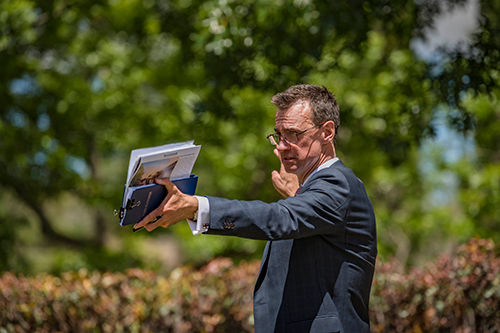Photography by Blackshaw Real Estate
Purchasing a property is one of life’s biggest financial transactions and it’s essential that buyers understand how to navigate the market. Here’s our guide to open homes, private sales and auctions in the capital.
Do Your Research
When it comes to buying a home, it’s important to understand the market as best as possible. Try to find out the value of properties in your desired neighbourhoods, what is currently on the market, and what has recently sold. You only have to look into the past two or three years, but you’ll be in search of steady price growth as this indicates a stable area. Be mindful that a neighbourhood that suddenly increases in value probably might not remain popular for long.
Open Homes
It’s obvious, but it’s crucial that you thoroughly inspect a property before buying it and an open home is your opportunity to do this. You not only need to carefully consider the size and location of the property, but all other house specifications. Be sure to make notes and ask lots of questions as small things can be missed that might cause delays or be costly at a later stage. A detailed and thorough inspection will also help give you an idea of the property’s value as you compare it to nearby properties that are on the market or have recently sold.

Photography by Najkhetsamtip
Contracts And Reports
If you’re interested in a property, be sure to request a copy of the contract first. If hoping to purchase a standard residential property in the ACT, the contract contains copies of the building, pest and energy reports. Contracts for some unit title properties, usually apartments and townhouses, will include an energy report and detailed body corporate records. It is advisable to go over these documents thoroughly so you are aware of any restrictions or particular conditions associated with the property. This will give you the opportunity to ascertain how much you would be willing to pay for the property to cater for any foreseeable costs or repairs in the future. If you are unsure about the contract or have any queries, have it examined by your conveyancer before any action is taken.

Photography by Annika Wischnewsky
Sale by private treaty
Sale by private treaty occurs when a home is advertised for sale at a set price or within a price range and private offers are invited. Would-be buyers often don’t know whether anyone else is making offers, and negotiations can stretch over several days.
FINANCES
One of the first things you need to do before buying a home via private treaty is to make sure your finances are in order and that you know how much you can borrow and spend, taking into consideration your deposit, stamp duty and legal costs. It’s best to have a pre-approved loan before you start house hunting, so you are able to act immediately when you find the right property.
MAKING AN OFFER
Offers can be made verbally or in writing. Simply contact the selling agent and tell them what you’re willing to pay for the property, your preferred settlement period and whether your offer is subject to inclusions, changes or conditions. Once you have formally made your offer, the agent will inform the seller. You should usually receive a response from the agent within 24 hours. Don’t fret if your first offer isn’t accepted. This is not uncommon. If you can increase your offer, continue to negotiate further with the selling agent. Some agencies may require a small holding deposit when the offer is made which can help establish goodwill. If your offer is accepted, the exchange of contracts will be arranged in due course.
COOLING-OFF PERIOD
Sometimes, a sale by private treaty entitles buyers to a cooling-off period. The length of this period is determined by legislation and varies between the various states and territories. It also allows the parties to negotiate special conditions, which might include a sale subject to the buyer obtaining finance or selling their own home. If the conditions aren’t met, the buyer can pull out of the contract without penalty.

Photography by BigC Studio
Sale by auction
If a home is for sale by auction, all the bidding happens in a public forum. A licensed auctioneer will set a time and date for the auction, and interested parties turn up and bid. You need to be registered to bid at an auction. This can be done on or before auction day. Once you are registered, you will be given a bidding number that you will need to clearly display every time you bid.

FINANCES
It is prudent to be well advanced in discussions with your lender prior to bidding at auction as there is no cooling-off period. It is important that you have your deposit ready for auction day. Be sure to discuss the deposit amount and payment options with your selling agent in case you are the successful buyer. In some cases, the owner may accept less than a 10% deposit.
BIDDING
If the property reaches reserve price and you are the final bidder, then you have purchased the property! All that is left to do now is to sign the contract and pay the 10% (or agreed) deposit. The deposit must be held by the seller’s real estate agent, conveyancer or legal practitioner in a trust account until the settlement date. If the property has not reached reserve price and you are the final bidder, you will have the first right to negotiate at the seller’s reserve price under auction conditions. If you do not wish to negotiate, the agent can then speak with other interested buyers. Should these negotiations be unsuccessful, the property will generally be placed on the market for private treaty at a price agreed to by the seller.
“If you have any questions, talk to the selling agent for any further details.”

Photography by Getty Images
SETTLEMENT TERMS
Well before auction day, be clear on your preferred settlement period and other terms and inclusions, including settlement length (e.g. 30, 60, 90 days), whether your offer is subject to inclusions (e.g. furniture), or other changes to the property (e.g. repairs or new work). Discuss these with the selling agent to ensure your needs can be met, or to see if there is room to negotiate. You may be able to negotiate and agree to a varied settlement period to that stated on the draft auction contract.

Photography by Adam Kaz
OFFERS PRIOR TO AUCTION
In some cases, the vendor may consider an offer prior to auction. As pre-auction offers are unconditional, all of your prepurchase due-diligence (finance, etc) should be completed in advance. A deposit and cooling-off waiver are normally required as part of the offer paperwork. Talk to the selling agent for further details.

Photography by 74 Images
Enjoy this complimentary magazine, become inspired and find endless possibilities for your own inspired living.
To read the e-brochure click here.





